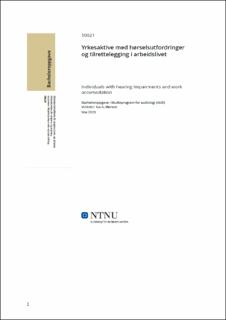Yrkesaktive med hørselsutfordringer og tilrettelegging i arbeidslivet
Bachelor thesis
Permanent lenke
https://hdl.handle.net/11250/3072973Utgivelsesdato
2023Metadata
Vis full innførselSamlinger
Sammendrag
BakgrunnDeltakelse i arbeidslivet for mennesker med hørselsutfordringer, er et tema som har fått økt fokus de seinere årene. Personer med redusert hørselsfunksjon har lavere yrkesdeltakelse enn normalbefolkningen og de har høyere risiko for sykefravær. Det trengs større forståelse for hva som skal til for å øke og sikre arbeidsdeltakelsen blant personer med hørselsutfordringer.
ProblemstillingI denne bacheloroppgaven ble følgende problemstilling belyst:Hvordan opplever mennesker med hørselshemming sin arbeidshverdag, og hvordan opplever de tilretteleggingen og bistanden de mottar i forbindelse med sine hørselsutfordringer?
MetodeIntroduksjon av hørsel, audiologisk rehabilitering og studier om tilrettelegging i arbeidslivet er rammeverket i oppgaven. Det ble benyttet kvalitativ metode for å belyse problemstillingen og tre yrkesaktive personer med redusert hørselsfunksjon ble intervjuet. Semistrukturert intervju ble brukt for innhenting av data.
Resultat Flere av funnene i denne oppgaven bekrefter funn fra tidligere forskning. Yrkesaktive mennesker med hørselsutfordringer opplever å være slitne. Høreapparater og hjelpemidler er til stor hjelp, men alene strekker ikke det til. De benytter derfor, mer eller mindre bevisst, ulike strategier for å fungere med sitt funksjonstap. De trenger veiledning, men møter dette i ulik grad. Det viktigste funnet i denne bacheloroppgaven er at informantene gjennom sine opplevelser beskriver at det er behov for bedre samarbeid og samhandlingsrutiner mellom de ulike aktørene i hørselsomsorgen.
KonklusjonMed bedre samarbeid og samhandlingsrutiner kan yrkesaktive med hørselsutfordringer få mulighet for tidligere og bedre hjelp. Dette kan muligens medvirke til å forebygge sykefravær og frafall i arbeidslivet. Summary in English
BackgroundParticipation in the workforce for people with hearing challenges has received increased attention in recent years. Individuals with reduced hearing function have lower work participation rates than the general population and are at higher risk of sick leave. There is a need for greater understanding of what it takes to ensure and increase work participation among people with hearing challenges.
Problem StatementIn this bachelor’s thesis, the following problem statement was addressed:How do people with hearing impairments experience their work life, and how do they experience the accommodations and support they receive in connection with their hearing challenges?
MethodIntroduction to hearing, audiological rehabilitation, and studies on workplace accommodations provide the framework for the thesis. Qualitative methods were used to illuminate the problem statement, and three employed individuals with reduced hearing function were interviewed using semi-structured interviews to collect data.
Results Several of the findings in this thesis confirm findings from previous research. Employed individuals with hearing challenges report feeling tired. Hearing aids and assistive devices are of great help, but alone are not enough. They therefore use, more or less consciously, various strategies to cope with their hearing loss. They need guidance, but receive this to varying degrees. The most important finding in this bachelor’s thesis is that the informants, through their experiences, describe a need for better collaboration and coordination among the various actors in hearing care.
ConclusionWith better collaboration and coordination, employed individuals with hearing challenges can have the opportunity for earlier and better help. This may possibly contribute to preventing sick leave and dropout from the workforce.
